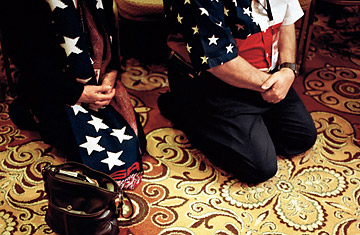
Convention attendees kneel in prayer at the National Tea Party Convention.
(3 of 6)
Smaller government is a venerable American philosophy--though one not always consistent with the public's passion for Medicare, farm subsidies, mortgage deductions, aircraft carriers and name-your-favorite-cut-of-pork. And calling forth the spirit of America's tea-dumping colonists in Boston has never been easier than it is now. One irony for Obama is that the Tea Party movement is using his own organizing techniques against him: Meetup.com announcements, Twitter tweets, viral videos, e-mail trees and all the other innovations falling under the politically potent umbrella known as social networking. Indeed, in the online age, the whole purpose of physical gatherings has changed. Real crowds draw virtual crowds, and vice versa, as David DeGerolamo, a Tea Party organizer from North Carolina, explained during a seminar in Nashville. Recounting how he built a statewide operation from scattered local groups, DeGerolamo said he started with a rally. "I went around and contacted as many of these groups as I could find and invited them to Asheville for what we called the first N.C. Freedom Convention." That was last May. When everyone was gathered, DeGerolamo coaxed the groups--notoriously prickly about their independence--to join under the banner of a single website, NCFreedom.us. Next, he convened a town-hall meeting "for one reason--to get YouTube videos," DeGerolamo said. "YouTube is one of our best allies in terms of becoming a communications network." Today, DeGerolamo's group sends out more than 6,000 e-mails a week, stages informal protest parades called Rolling Tea Parties and posts dozens of videos of the movement in action.
The rapid rise of Tea Partyism has derailed much of the Democratic agenda in Washington, cuing a chorus of intramural recriminations and setting off a string of congressional retirements. With Brown delivering the 41st vote to sustain a threatened Republican filibuster in the Senate, health care reform may be on ice until next year. Another signature Obama initiative, capping carbon emissions, is snowed under. The House blames the Senate, the Senate blames the House, and both chambers point accusing fingers at the White House. Obama, meanwhile, is struggling to find a tone of voice that resonates in Tea Party America, alternating chords of raging populism and calm centrism, sometimes both on the same day.
But Democrats are not the only ones rattled. Tea Partyers are boosting former Republican state legislator Marco Rubio's challenge to Governor Charlie Crist for the GOP's U.S. Senate nomination in Florida. In Arizona, the movement is targeting Senator John McCain, whose willingness to compromise on issues like immigration makes him vulnerable to former Representative J.D. Hayworth in the primary. Indiana Republican Dan Coats, a former Senator, is itching to get his job back after the retirement of Democrat Evan Bayh. But he too hears rumblings on his right. It is the sound of Tea Partyism on the march.
The Three Flavors of Tea
